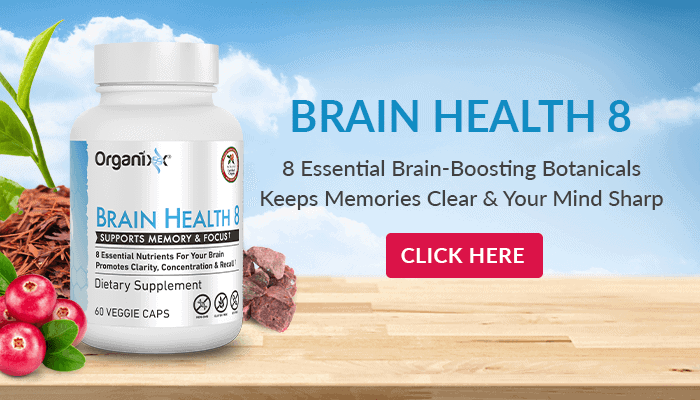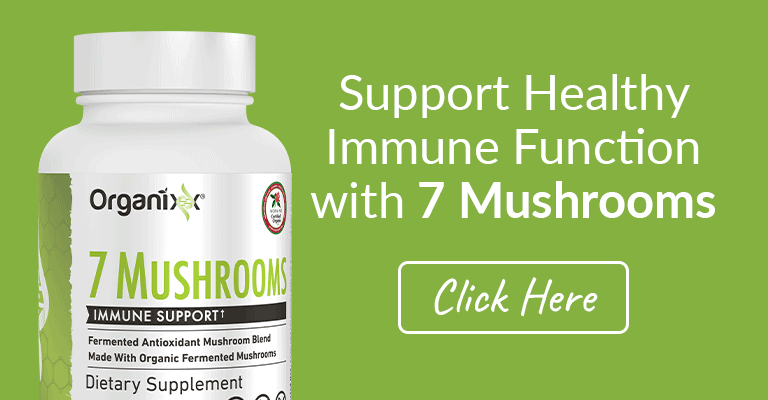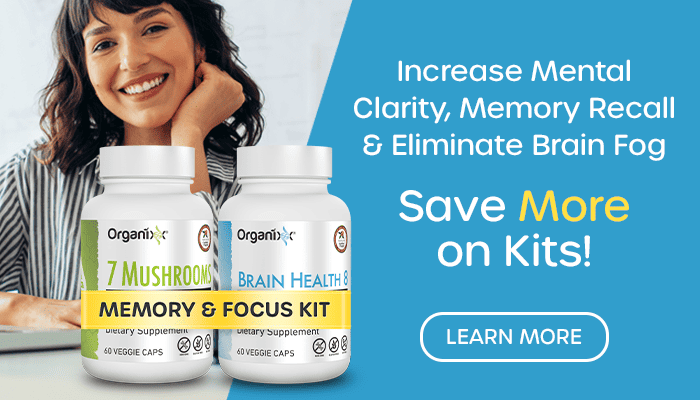Video Transcript:
With kids returning to school, one of the things that us parents like to focus on is supporting our children’s brain health, and I’m going to share with you two amazing supplements that we have here at Organixx that I use in my son’s daily supplement routine. It’s a little bit of a more unique routine in that I take the capsules and I will break them open and I will put a third of the capsule in some sort of yogurt or smoothie mix, applesauce, or even a juice packet.
The Power of Fermented Functional Mushrooms
So, I want to share with you two resources that we have that are amazing. First of all, 7 Mushrooms [formerly 7M+]. It is amazing. There are a multitude of powerful, functional mushrooms that can help support powering up your child’s brain, and one of the things that’s really awesome about this blend is it’s fermented. So, we ferment the mushroom extracts in an adaptogenic, kind of liquid fermentation. So, this also adds to bioavailability of the powerful nutrients in the mushrooms, but also adds to stress management resources – adaptogenic herbals that can lower children’s stress levels.
So, functional mushrooms and 7 Mushrooms [formerly 7M+], some of the ones that I’m going to highlight today:
Lion’s mane is categorically one of the best functional mushrooms for brain function. We know that especially with young minds as kids are learning and teenagers, their brains are kind of resetting all the time. One of the things we know is that lion’s mane can really help support the neuroplasticity and the turnover of good healthy brain cells. So, we actually see the neurons firing in a stronger way and also developing in a healthy way so that their brain function, their memory improves, and overall, we see really powerful brain enhancement through the use of functional mushrooms.
There’s also chaga, which is a really good powerful antioxidant. There’s reishi and maitake – some really good mushrooms that we know are beneficial for immune health – but also are good for brain support. So, 7 Mushrooms [formerly 7M+] is one of the ones I will take one of these capsules, I will open it up, and I will put a third of the contents in a smoothie or a yogurt mix.
Brain-Supportive Botanicals and Herbs
The other one that is specifically brain-focused that we have is Brain Health 8 [formerly Ageless Brain]. So, it’s not just for us individuals in our mid-life or more senior time of our life, but we can use the properties of bacopa and camu camu to help support our kids’ brain health. And this is another one that we would open up and use a quarter of the capsule for the children’s version or the children’s dose. So, these two, 7 Mushrooms [formerly 7M+] and Brain Health 8 [formerly Ageless Brain], are really powerful for kids’ brain-supportive supplementation.
I’m excited to share this with you because one of the things with school returning, there’s a lot of kind of catch-up that happens, making sure kids are at the level where they left the previous grade, and so a lot of times there will be a lot of expectations put on kids and it can be stressful and it also requires that mental focus.
So, these two supplements, 7 Mushrooms [formerly 7M+] and Brain Health 8 [formerly Ageless Brain], can really help bolster your child’s learning and also retention as they learn new skills and tactics, techniques, and practices at school. So, I’m excited to share this tip for us parents out there who want to support their kids’ brain health.
Better Focus… Crystal-Clear Thinking… a Razor-Sharp Memory… ALL Are Within Your REACH! Each and every bottle of our Organixx Brain Health 8 formula contains a total of 8 superstar ingredients, straight from the AMAZON rainforest.

Video Transcript:
Today, I want to share with you several unhealthy brain influences that you actually have more control over than you might realize in the overall state of your mental health and the health of your brain and its functionality. So, I’m super excited to share with you these items.
1. Not Getting Enough Sleep
Number one, and most important for your brain is sleep. So, if you are dealing with irregular sleep patterns, insomnia, maybe you’re a shift worker, and so you’re not sleeping at the kind of normal time of sleeping, and you’re getting less than seven and less than eight hours of sleep each night – that solid, continuous, good, deep sleep – then that influence of irregular, imbalanced sleep has a deep, deep negative effect on the state of your brain health. And in fact, about five or six years ago, researchers identified that when we sleep, and we sleep solidly throughout the night, that actually triggers and engages the lymphatic process of your brain.
And we call that lymphatic process the glymphatic process. And your glymphatic process is the only time your brain is detoxing and cleaning out cells that are no longer serving it. It’s getting rid of inflammation, and it’s processing out that toxicity.
So, think of the glymphatic system as the nighttime cleaners in an office. So, when we work at normal offices and we go home during the day, there’s usually a shift that comes in and cleans and gets everything ready so it’s nice and clean. All of the waste baskets are cleaned, and you’re ready to have a clean work environment the next morning. The brain does that.
And so, by sleeping optimally and starting your sleep process around 9:00 and 10:00 PM, that helps trigger melatonin production, and it helps trigger other sleep-related biochemistry that helps to enhance the glymphatic process. So, that’s really, really important. And that’s number one. If you’re not sleeping well, that’s the first sign of an unhealthy brain state.
2. Too Much Stress
The second item that tends to be a negative influence in the state of your brain health is stress, especially chronic stress. Acute stress and chronic stress, these collectively are detrimental to your brain health.
Stress, especially cortisol, the stress hormone, is an inflammatory hormone. It causes brain-oriented inflammation. It also changes our biochemistry and our neurotransmitters. Those are neuroendocrine hormones that it’s all happening up here in the brain and sending signals and communication down to organs and glands and soft tissue. And stress can cause brain imbalances.
And just think about your own life. If you’ve had a stressful event over a course of weeks or even a few years, that can influence your mood. It can influence your reproductive hormones. It can influence your digestive process. So, stress is very much at play when we’re looking at unhealthy influences on our brain health.
3. Unhealthy Diet Lacking in Key Nutrients & Proper Hydration
Now, the third, most obvious is going to be what you’re consuming. What are you eating, your diet? This includes your liquid diet, so, making sure you’re staying well hydrated, avoiding caffeine, and avoiding alcohol, and things that are dehydrating. And also consuming healthy fats and omegas, and eating a rainbow of micronutrients.
And making sure that that diet also includes functional mushrooms. Lion’s mane is one of my favorites for the brain. Also, cordyceps is very powerful for the brain, as is reishi and shiitake.
These mushrooms we actually encapsulate here in our 7 Mushrooms. If you’re like, “Can’t stomach the mushrooms,” I get it, or cannot find them in your supermarkets, you can use 7 Mushrooms and encapsulate those mushrooms. But adding mushrooms to your diet is also going to be critical. Mushrooms like chaga is also an anti-inflammatory and it’s an adaptogen.
So, there’s a lot of power in supporting your brain via your diet, and that’s really important, too. Making sure you’re getting good, healthy multi-minerals. Eating nuts and seeds are going to deliver really key nutrients like magnesium and selenium and chromium – all powerful for helping balance blood sugar, which supports our brain health.
4. Not Getting the Right Exercise
Now, fourth on my list here is to exercise. That’s really important for functional brain health and improving circulation and blood flow and triggering that glymphatic process at night. But importantly, the type of exercise that you’re partaking has a powerful influence.
Exercises that combine balancing activities are going to be the most ideal, as well as rebounding. I love rebounding. It’s great for your lymphatic process, which in turn helps enhance that glymphatic flow. But making sure you’re doing things that are balancing – so, lifting weights on one foot versus two adds another element of muscle control, but also invigorates the brain.
So, if you are not exercising in a way that is kind of pushing the envelope and you’re doing balancing exercises on top of that – yoga and Pilates are great for that, as are stable exercises where you’re working on one foot and then alternating. Even doing pushups with one hand or alternating. Those are all great for enhancing your brain function. So, if you’re not doing that, that’s an unhealthy influence.
5. Exposure to Toxins
Now, the other element that many folks are aware of, but sometimes aren’t tuned in to in terms of just how pervasive these are, but an unhealthy brain influence are toxins in our everyday environment. These toxins range from perfumes to heavy metals that affect our brain and our nervous system. Pesticides. These are things that we’re using in our homes, we’re using them outside of our homes. We might be consuming them in the foods, the healthy diet, even organic foods tend to be dense in pesticides, depending on the type of plant and its exposure.
As well as our air pollution. Depending on where you live, I happen to live in a city, a metroplex that is on the higher side of poor air quality. So, we can have harmful chemicals that we’re breathing in our air, at our home, in our work environment, outside.
And then also in this category are going to be illegal drugs and alcohol and even certain medications. Pharmaceutical medications are going to fall into this category, because some of them will negatively impact our brain function by way of some of the particular synapses and blocking things that they do in our brain. So that’s really, really important.
6. Continuing Unhealthy Habits That Overwhelm the Brain
And then the last and final is to really avoid unhealthy habits like excessive caffeine consumption, excessive alcohol consumption, and excessive smoking or drug use. So, just be cognizant that if you’re having a glass of wine here or there, that’s not as overwhelming as say, a full bottle of wine or a half bottle of wine or a six-pack of beer.
These influences, especially smoking, they not only bring in overwhelming chemicals, but they can dehydrate the brain and overwhelm the brain in toxic chemicals that we have to make sure the brain is detoxing out.
And I also pull in this category, the diet-related products. This is something that a lot of folks, especially folks going keto, we are seeing alternative sugar sources overwhelming the brain. Particularly, the hypothalamus has a really, really hard time processing out aspartame. So, the Diet Cokes, diet sodas, sugar-free products – read your labels, be very cognizant of what you’re putting in your body, and it has a direct influence, sometimes negatively, on your brain health.
So, I hope these tips are helpful. Just really want to encourage you to be mindful of taking care of your brain, and it will take care of you for the extent of your entire life.
7 Mushrooms from Organixx contains 7 of nature’s most powerful mushrooms for anti-aging, longevity, and immune support. Using centuries-old knowledge of the power of nutritional mushrooms and our breakthrough new formulation process we’ve unleashed the power of mushrooms in a way never before done.
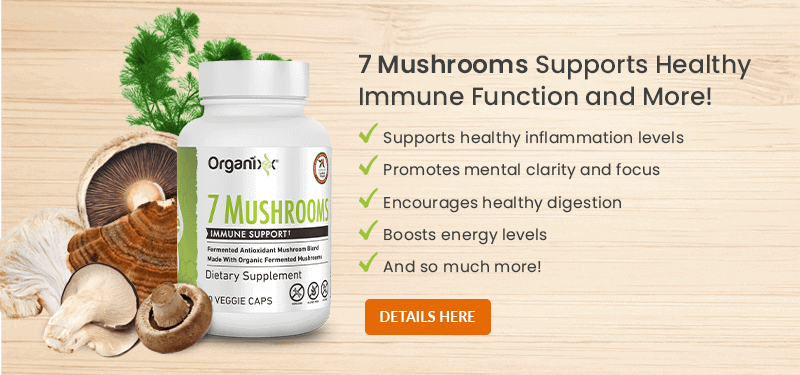
Video Transcript:
Today, I’m really excited to share with you five different things you can do every single day to support and protect your brain health. This is great for individuals of all ages and, if you have a family history like I have of Alzheimer’s and dementia, these are really critical in lowering your risk factors in developing those degenerative diseases.
1. Play Brain Games
Number one of the most impactful and important things you can do every day, is to mentally invigorate your brain. This classification would be things like mental games and applications like phone apps, where you can download… MindPal is one of my favorite apps…. where you play brain games. This is how we can use technology to help support that.
But also things like Sudoku and games like chess and other games that are going to use your mind, you want to constantly be activating your memory, problem-solving skills. Mental games are great for that, and the apps have a lot of scientific data. They queue up a lot of different brain games to help support, invigorate the brain centers so that you’re constantly rejuvenating and sending circulation and energy and focus to those different parts of the brain.
2. Practice Self-Care
Number two in protecting your brain is practicing self-care, meaning employing tactics that help you sleep better, that lower your stress levels, and encourage things that will calm your body and calm your central nervous system.
Sleep and exercise and stress management like massage, yoga, tai chi, getting out walking, being in nature, grounding – those are all good practices of self-care. I even put in “self-care” good-quality nutrition in this category. Just loving and nourishing your body and nourishing your brain with all the different choices you make on a daily basis.
3. Supplement with Nootropics
Number three, I love to add brain-oriented supplements and nutrition, brain-based nootropics. We have our Brain Health 8, which is a nootropic blend of assorted herbals and medicinal herbs that help enhance and invigorate brain health. Similarly, adding things like 7 Mushrooms and functional mushrooms encourages the enhancement and the connection of new neurotransmitters and synapses and neuro pathways in your brain.
4. Do Balancing Exercises
Fourth in this category is actually something that most people aren’t tuned into, but we know from recovery, from traumatic brain injuries of folks who’ve had accidents or injuries to the brain, one of the most impactful things that you can do to enhance your brain function and protect your brain is to deploy exercises and activities where you are forcing your body to balance.
Simply getting a balance board or a wobble cushion and doing something as simple as standing on and trying to level yourself or taking one foot and keeping that level and raising another foot, trying to balance.
There was actually a whole viral, I think it went viral in the last year on Instagram and TikTok, where one of the best functions of balance and is an indication of how healthy your brain is, functionality-wise, is to balance on one foot while putting a sock and shoe on the other foot and maintaining your balance. That seems like a simple task, but when you try it and you might be out of balance, as you fine-tune and use those different muscles along your spine, you’re also invigorating the process of your brain. You’re actually helping connect different parts of the brain or reconnect. Balance is really important.
5. Use Your Less Dominant Hand or Foot to Create New Pathways
In that same vein, my fifth resource that we can use every day to protect your brain and enhance your brain function is to take everyday tasks and use a different hand. If you’re right side, I’m right side dominant, so I’m righthanded, I do a lot of things with my right hand.
Even when I run, I start with my right foot. Well, if you change that up and you either feed yourself with your non-dominant hand, with your left hand, or you try writing with your left hand, or you try kicking the ball with your left foot first versus your right, or start running with the left foot first, not the right. If you switch that just simple activity up, that creates this new pathway and creates and develops new neurons. That’s this whole kind of interesting process of enhancing and engaging the brain.
Just like our muscle groups – we have to break muscle and we rebuild – the brain is the same way. But if we change our tasks, it kind of forces the brain to get outside of the normal routine and that is where we see greater brain enhancement when we have scans of the brain. When an individual goes from regular right-handed to writing with their left, it invigorates other parts of the brain.
This is a really powerful way to protect your brain and to enhance and encourage new tasks in your life. Same thing with learning a new language. That’s a really good thing also to invigorate your brain health.
Ready to Dive Deeper?
These are things that are great for enhancing your brain health, supporting and protecting your brain. I also have, if you’re really wanting to deep dive and kind of biohacking resources for your brain, I have created a masterclass. It’s called Biohack Your Brain, and we go deep-diving into using nootropics, dig into supplements like our Brain Health 8 and also 7 Mushrooms, and how to create new connections, how to invigorate new neuron growth and new neuron pathways, so that you live your healthiest, longest brain-healthy life, which is really critical. That’s a huge part of our function, not just in our mental health and emotional health, but also in the way the body functions and how it processes.
I hope these tips are helpful. I’m going to encourage you to Ask the Doctor, send me any questions that you have, and I will be answering specific brain health questions in future Ask The Doctor answers. Thanks for tuning in. I hope this is helpful.
Brain Health 8 and 7 Mushrooms from Organixx: When you combine these two powerful supplements together, you get a synergistic effect that gives your brain the nutrients needed to support optimum memory, focus, and clarity.
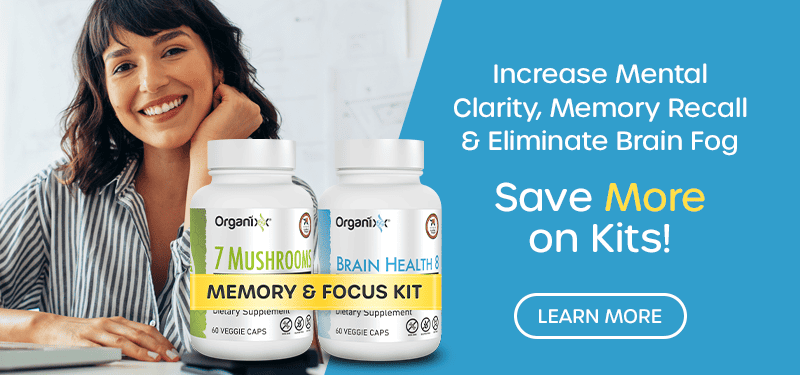
Video Transcript:
Colleen asks: “Is being on an Aromatase Inhibitor, potentially like a Tamoxifen, putting her at a higher risk of dementia or Alzheimer’s?“
That’s an excellent question, Colleen. I actually work with a ton of breast cancer patients and thrivers and survive that are often on estrogen-blocking or hormone-blocking medications after their initial cancer diagnosis. And so often we’re seeing 5, 10, 15 years of taking these medications. And that’s definitely a concern that I do want to address. I will let you know, there has been some clinical analysis and research in a very large group of women.
What Does the Research Say?
So, we’ve looked at over 50,000 women in addressing, “Will taking a medication like Tamoxifen to starve any potential cancer cells of reoccurring, does that set a woman up for dementia, Alzheimer’s, or any type of brain-related health imbalances?” And what research shows is that it’s inconclusive. So, that is kind of an interesting point there.
So, we’ve looked at over 50,000 women in addressing, “Will taking a medication like Tamoxifen to starve any potential cancer cells of reoccurring, does that set a woman up for dementia, Alzheimer’s, or any type of brain-related health imbalances?” And what research shows is that it’s inconclusive. So, that is kind of an interesting point there.
Now, the other thing that that research did show was that the women in the study had a lowered propensity of diagnoses with Alzheimer’s and dementia. So, I think what I recommend and will communicate to you here is that it depends on each person’s case and we all have genetic propensity, or disposition, to possibly have dementia or Alzheimer’s occur in our body. From looking at our family members, our mothers, our fathers, aunts and uncles, and even siblings.
Supporting Brain Health is Key
So with that being said, I always recommend supporting your brain health by doing several things. Our brain is comprised of fat and water. So, you want to make sure you’re consuming good, healthy fats on a daily basis to bolster the fat content of our brain. And you want to make sure you’re not being dehydrated or in a dehydration state. Many individuals are not drinking enough fluids or liquids.
If you consume coffee, you want to have the same amount of liquid, meaning water, mineral water, or good healthy green juices. So, you want to make sure you’re getting hydrated properly. The other thing that I recommend, that Organixx provides, is Brain Health 8 [formerly Ageless Brain]. This has two really amazing neuroprotective compounds in the ingredients, as well as a whole bunch of other benefits for supporting your brain health.
But I want to zero in on Camu Camu and Bacopa. Those two have been extensively studied. These two ingredients in Brain Health 8 [formerly Ageless Brain] are amazing for helping your brain cells regenerate, rejuvenate, repair, and recover. And I have a lot of patients that have had chemotherapy or even radiation of the head and neck and I always recommend neuroprotective and neuro regenerating supplementation. So, Brain Health 8 [formerly Ageless Brain] would be something I would recommend for you.
Reducing Inflammation and Invigorating the Lymphatic System
Now, the other thing that’s really important is to lower your inflammatory levels or inflammation that might be present in your body systemically as well as in the blood and the brain.
So, I want to recommend one of my other, another favorites of mine here at Organixx, is the Joint & Muscle Care. This is a trio. Call it the trinity of master anti-inflammatory properties. What you’re going to get there is just an overall systemic lowering of inflammation levels with the turmeric, which is a fermented turmeric. So, you get the bioactive max benefits of the anti-inflammatory properties of turmeric. Turmeric will invigorate the lymphatic system.
And for any of my breast cancer patients, I want to make sure we’re getting lymphatic flow. And especially when we’ve had breast cancer, radiation, and chemo, and even surgeries where we had lymph nodes removed, we want to make sure we’re clearing the head and neck lymphatics because often that gets stagnated with surgeries and radiation. So those are my tips.
A Bonus Tip: Antioxidants
My bonus tip is to look at adding maybe a little Moringa tea to your daily diet. Moringa is an amazing tropical plant that has also been extensively studied for its massive antioxidant benefits. And there are links to the antioxidant levels and when we increase those to help brain rejuvenation.
So, those are my tips for you, Colleen. Please comment and let us know how you do with that.
Better Focus… Crystal-Clear Thinking… a Razor-Sharp Memory… ALL Are Within Your REACH! Each and every bottle of our Organixx Brain Health 8 formula contains a total of 8 superstar ingredients, straight from the AMAZON rainforest.

Whether you’re a “foodie,” self-proclaimed “health nut,” or just like to be in the know about natural foods and substances that are good for the human body… the lion’s mane mushroom needs to be on your radar.
Lion’s mane is a rather unusual looking fungus with a flowing white, hair-like appearance that’s beloved as both a tasty edible mushroom and a medicinal mushroom in Japan and China. It’s also found in North America and was known to the native people who used it in powdered form for its ability to treat and heal open wounds.
Similar to many other varieties of medicinal mushrooms, lion’s mane prefers to grow on fallen hardwood trees, especially the beech tree. Its scientific name is Hericium erinaceus while it’s also commonly known as yamabushitake in Japan and hóu tóu gu in China. You might also hear it referred to by other names including:
- Satyr’s Beard
- Monkey Head Mushroom
- Bearded Tooth Mushroom
Whether you’ve never heard tell of it, or have seen it for sale at a farmer’s market or Asian food store and wondered, what is lion’s mane mushroom good for?… you’ll want to read on to discover these 7 key lion’s mane mushroom health benefits.
Lion’s Mane Mushroom Studies: What the Research Shows
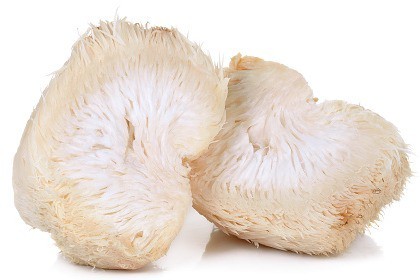
Scientific research over the past few decades has demonstrated that phytochemicals (natural, plant-based compounds) found within Hericium Erinaceus have some substantial benefits for health, including significant antioxidative activity.
The key compounds that appear to be chiefly responsible for the wide range of health benefits of lion’s mane mushroom are:
- hericenones
- erinacines
- beta-glucan polysaccharides
Lion’s mane mushroom is also known to be immunomodulatory, meaning that it can stimulate or suppress the immune system to enable it to better respond to threats.
Researchers have also reported cholesterol-lowering, nerve-protecting, nerve-regenerating, anti-diabetic, and anti-cancer properties. Want to discover more about the studied health benefits of lion’s mane? Let’s dive in!
#1. Lion’s Mane and the Nervous System
While a great deal of research has been done on this unusual mushroom, the “lion’s share” of that research (if you’ll pardon the pun) has been centered around its impact on the nervous system.
The nervous system comprises the brain, spinal cord, and the nerves that travel through the body. Everything works together to send and transmit nerve impulses, which are signals that control almost every function in the human body.
When an injury occurs to the brain or spinal cord, it can take a long time to heal. Excitingly, research on lion’s mane mushroom (let’s abbreviate that to LMM) has found that it helps to speed recovery from these types of injuries.

First off, LMM stimulates the production of nerve growth factor (NGF), a protein that stimulates nerve cells to grow. LMM also has neuroprotective properties and helps regenerate damaged cells.
LMM has also been widely studied with regard to its ability to help diseases of an aging nervous system, including:
- dementia
- stroke
- Parkinson’s disease
- Alzheimer’s disease
Since pharmaceutical companies have spent billions on finding medications to cure or at least relieve the symptoms of these serious health conditions with limited success, any progress in this area is incredibly promising. It’s important to point out, however, that the research into LMM’s potential benefit for these specific diseases is still preclinical (i.e., studied in test tubes and with laboratory animals).
Many Studies into
Researchers conducting studies on lion’s mane mushroom extracts have reported the following benefits in relation to the brain and nervous system:
- Provides potent antioxidants that afford anti-inflammatory protection to nerves [1,2].
- May improve mild cognitive impairment, both in animals and in people [3-5].
- Induces the secretion of nerve growth factor (NGF), a protein involved in the regulation of growth, maintenance, and survival of nerve fibers [6-8].
- Has neuroprotective properties [9-12].
- May help protect against and ease the symptoms of Alzheimer’s disease [13-16].
- Exerts a positive influence on the fatty material that wraps protectively around nerve cells and helps to transmit electrical signals from nerve to nerve. Known as myelin, it is the loss of this protective fatty layer around nerve cells that leads to diseases like Multiple Sclerosis and other neurodegenerative diseases [17].
- May promote nerve healing and regeneration following injury [18-20].
- May ease the symptoms of diabetic neuropathy [21].
- May help protect against the progression of aging and degeneration of the nervous system [22].
- May help to prevent the death of nerve cells and brain damage after seizures or stroke [23,24].
- Is easily absorbed by the brain and body as lion’s mane compounds have the ability to cross through the protective blood-brain barrier [25].
#2. Lion’s Mane and Depression & Anxiety

Antidepressants have become one of the most widely prescribed medications across the globe [26]. The most popular variety is known as Selective Serotonin Reuptake Inhibitors (SSRIs), which enhance the neurotransmitter serotonin in the brain.
SSRIs are prescribed not only for depression but also for anxiety, eating disorders, obsessive-compulsive disorder, and a number of other mental health conditions.
A potential problem with SSRIs, however, is that they tend to come with a long list of side effects. Some of the more common SSRI side effects include [27]:
- insomnia
- skin rashes
- headaches
- muscle and joint pain
- digestive upset
- nausea
- diarrhea
- diminished sexual interest
Lion’s mane mushroom (LMM) has been reported to have anti-depressant activity, both in preclinical animal studies and human trials. The mycelia of the mushroom contain the phytochemical erinacine, which has been shown to help with the creation of neurotrophic factors in the brain [28].
Neurotrophic factors influence the growth, survival, and other functions of neurons (nerve cells). This action of erinacine has been hypothesized to play a role in depression.
Also, as noted before, LMM also stimulates the synthesis of nerve growth factor (NGF) which has an effect on brain and nervous system function [29].
A small 2010 human trial [30] found that only four weeks of taking LMM by 30 menopausal women reduced depression and anxiety in this group.
In an effort to better understand the effects of LMM on the brain and nervous system, a 2018 animal study [31] found that four weeks of administration promoted the generation of new nerve cells in the hippocampal region of the brain. (The hippocampus is involved in higher cognitive function, memory, and behavior). Researchers also found that LMM extracts reduced anxiety and depression in test animals.
Another 2018 animal study [32] reported that administration of LMM increased levels of the neurotransmitters norepinephrine, dopamine, and serotonin in the brain. LMM also blocked inflammatory pathways and regulated neurotrophic factors (as discussed above).
A 2019 human clinical trial [33] found that LMM given to 77 overweight or obese volunteers prone to binge eating decreased levels of depression, anxiety, and improved sleep after only eight weeks.
#3. Lion’s Mane and Hearing Loss
With so many studies demonstrating that LMM has profound effects on the nervous system, it’s no surprise that scientists have begun investigating if it can also help the nerves associated with hearing.

Presbycusis, the most common type of hearing loss, caused by the natural aging of the auditory system, has been shown in studies to often precede the onset of clinical dementia. Scientists also believe this hearing loss may also be an early warning signal of the onset of Alzheimer’s disease [34].
Human studies involving patients with sensorineural hearing defects (hearing loss where the root cause lies in the inner ear or the vestibulocochlear nerve) have found that the amount of circulating nerve growth factor is relatively low compared to the level found in patients with normal hearing [35].
A 2018 review of medical studies [36] investigating LMM for its effects on nerves discussed a particular study with aging mice. The results of the study indicated that the animals treated with LMM had significantly lower hearing thresholds compared with the control group. In other words, LMM helped the animals to hear better. LMM was also found to be effective in slowing hearing deterioration.
While this beneficial effect on hearing has not yet been proven in humans, it points once again to the significant beneficial role that lion’s mane mushroom is believed to have on nerve health.
#4. Lion’s Mane and the Immune System
Similar to other medicinal mushrooms like reishi, turkey tail, and maitake, lion’s mane mushrooms have important demonstrated benefits for the immune system.
Many studies [37-40] have concluded that lion’s mane mushrooms are immunomodulating agents, which means they have the ability to either stimulate or suppress the immune system (depending on what it may need) and may help the body fight infections, cancer, or other diseases.
This ability to modulate the immune system, in simpler terms, means that if the immune system is under-reacting to a threat (such as abnormal cell growth), LMM can help to augment its activity. In instances where the immune system is over-reacting, as it does with allergies and health problems like rheumatoid arthritis, LMM can act to help dampen down the immune response and inhibit its action.
#5. Lion’s Mane and the Digestive System
Many people are paying a lot more attention to their digestive health these days and for good reason. If you’re not absorbing food and nutrients properly due to digestive disorders such as “leaky gut” (intestinal permeability) or irritable bowel syndrome (IBS), you won’t be feeling as well as you might, nor operating at your best.
LMM has been shown in a number of studies to assist digestive health in several ways. Firstly, it acts as a prebiotic, providing food for and helping beneficial gut bacteria do their important work [41].

LMM also protects against the development of stomach ulcers by inhibiting the growth of a pathogen known as Helicobacter pylori which has been shown to be related to the development of stomach ulcers [42-45]. In addition, LMM exerts a protective effect on the inner layer of the digestive tract, known as the mucosa [46].
Both animal and human studies [47-53] have demonstrated that the anti-inflammatory benefits of LMM help to ease the symptoms of colitis and ulcerative colitis and other chronic inflammatory gut conditions.
#6. Lion’s Mane and Heart Health
There are a number of potential health benefits for the cardiovascular system when supplementing with lion’s mane mushroom.
Platelets are a necessary component of the blood. For instance, when you cut yourself, they keep you from bleeding to death by forming a clot at the site of the injury. However, when platelets begin to clump together abnormally, this can raise your risk of cardiovascular disease. A 2010 study [54] found that LMM inhibited the clumping of platelets.
High blood cholesterol levels can also increase the risk of cardiovascular disease. Several studies have demonstrated the ability of LMM to improve the metabolism of fats and to lower cholesterol levels [55-57].
Additionally, an in vitro (test tube) study found that LMM may help to prevent the oxidation of cholesterol in the bloodstream [58]. The importance here is that cholesterol molecules, when oxidized, can attach to arterial walls and cause them to harden. This hardening has been found to increase the risk of stroke and heart attacks.
#7. Lion’s Mane and Healthy Cell Activity
LMM may also be beneficial for promoting healthy cellular activity due to its impressive array of antioxidants, beta-glucan polysaccharides, and other phytochemicals that work in a variety of ways within the body.
Preclinical studies with cells and animals have shown that lion’s mane mushrooms have significant antitumor effects against:

- breast cancer cells [59]
- colon cancer [60,61]
- leukemia [62-64]
- gastrointestinal cancer [65-67]
- cervical cancer [68]
- liver cancer cells [69-71]
Since there have been few to no human studies performed yet utilizing lion’s mane for cancer patients, it is NOT advisable to rely solely on lion’s mane for your cancer therapy.
Combined with other treatments, however, LMM may offer some benefits for cancer patients, especially insofar as they help to modulate the action of the immune system. Animal studies to date have shown that lion’s mane mushrooms are non-toxic and safe to use [72].
Lion’s Mane Mushroom Studies Reveal Even More Potential Health Benefits
If all of the amazing Lion’s mane mushroom health benefits listed above aren’t enough, researchers have turned up even MORE potential health benefits of lion’s mane.
Here’s a quick rundown of 7 ADDITIONAL lion’s mane mushroom benefits:
- Anti-viral – A 2010 study [73] found that LMM had anti-viral properties against Human Immunodeficiency Virus 1 (HIV-1), the virus that can lead to AIDS.
- Anti-microbial – A 2012 animal study [74] demonstrated the anti-microbial properties of LMM. Researchers found that daily supplementing the feed of mice infected with Salmonella typhimurium (which can cause food poisoning – gastroenteritis, typhoid fever, or enteric fever) with LMM nearly quadrupled their life span.
- Kidney-protective – A 2013 study [75] found that LMM had kidney-protective properties.
- Liver-protective – 2015 research [76] found that LMM was liver-protective.
- Obesity-related inflammation – A 2015 study [77] found that LMM prevented or eased the inflammation released by fat tissue associated with obesity.
- Anti-diabetic – Several preclinical studies [78,79] have demonstrated the anti-diabetic, blood-sugar-lowering properties of LMM.
- Muscle endurance – A 2019 animal study [80] found that supplementation with LMM enhanced and increased muscle endurance.
Where to Get Lion’s Mane Mushroom?
If you’ve never eaten lion’s mane mushroom, there is certainly strong evidence to add this functional food into your recipe repertoire (we have some tips on cooking mushrooms here).
Fresh lion’s mane mushrooms are a bit of a specialty item that you probably won’t find on many supermarket shelves. Depending on where you live you may be able to find them in gourmet food shops, farmer’s markets seasonally, or in Asian food stores.
Because sourcing fresh lion’s mane mushrooms can be challenging (not to mention you need to be 100% assured with mushrooms that you’re getting the correct edible variety), supplementation can be a convenient alternative.
If you go this route, it’s important to work with a qualified healthcare practitioner and only purchase USDA certified organic products from a manufacturer you can trust.
Lion’s mane mushroom is one of 7 potent nutritional mushrooms found in Organixx 7 Mushrooms formula. The organic mushroom varieties selected for 7 Mushrooms are among the most clinically researched mushrooms on Earth, known for their immune system support and anti-aging properties.
7 Mushrooms from Organixx contains 7 of nature’s most powerful mushrooms for anti-aging, longevity, and immune support. Using centuries-old knowledge of the power of nutritional mushrooms and our breakthrough new formulation process we’ve unleashed the power of mushrooms in a way never before done.



